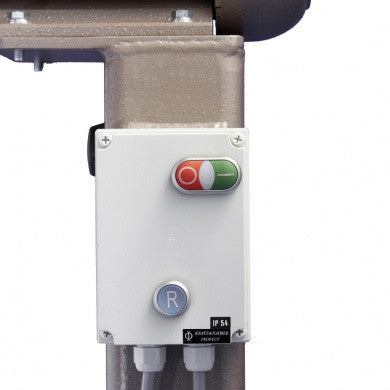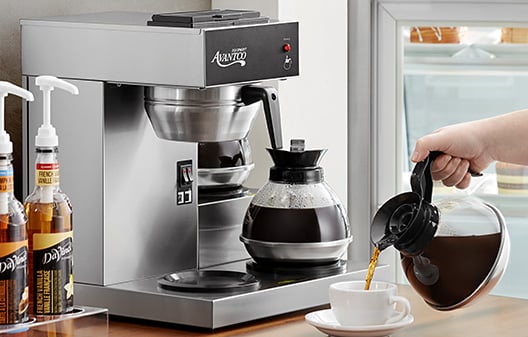Exactly How to Select the Perfect Industrial Coffee Grinder for Your Business
Selecting the excellent industrial coffee mill for your organization is a diverse choice that calls for cautious consideration of several critical aspects. Furthermore, comprehending the various types of grinders readily available can substantially affect your functional efficiency.
Assess Your Grinding Requirements
When choosing a commercial coffee mill, one need to initially evaluate their grinding demands to make sure optimum efficiency and uniformity. This initial examination entails understanding the volume of coffee to be refined daily, along with the preferred grind size for various brewing techniques. A high-capacity grinder may be required for businesses serving large quantities of coffee, while smaller procedures might locate an extra small design adequate.
Additionally, it is necessary to think about the sorts of coffee beans being utilized, as different beans might call for particular grinding techniques to accomplish the most effective flavor profile. As an example, oily beans may necessitate a grinder designed to handle such characteristics without overheating or clumping.
Another important factor is the required work consistency. Specialized coffee companies usually demand accurate grind dimensions to enhance extraction and flavor, making it important to choose a grinder that can provide consistent outcomes. Reviewing the readily available space and electric requirements will help in picking a mill that fits perfectly right into your functional workflow. By extensively analyzing these aspects, services can make enlightened choices that align with their coffee grinding requirements, eventually leading to a premium item and pleased customers.
Understand Mill Types
Recognizing the numerous kinds of industrial coffee grinders is vital for making a notified choice that meets certain operational needs. There are primarily 2 groups of mills: blade mills and burr mills.
Blade grinders utilize rotating blades to slice the coffee beans, leading to an irregular work dimension - Industrial Coffee Grinder. While they might be a lot more cost effective, they are frequently not appropriate for commercial applications where precision is crucial
On the other hand, burr mills provide a more uniform grind by squashing the beans between 2 surfaces. They can be further classified right into level burr and conical burr grinders. Apartment burr mills use a regular grind dimension and are usually preferred for coffee prep work, while conelike burr mills are versatile and can deal with a variety of brew approaches, from espresso to French press.
When picking a grinder, think about the particular demands of your organization, including preferred grind uniformity, production volume, and the kinds of coffee drinks you plan to use - Industrial Coffee Grinder. Each grinder kind has its limitations and advantages, so recognizing these subtleties enables educated decision-making that straightens with operational goals
Evaluate Work Size Uniformity
Achieving grind dimension consistency is crucial for generating high-grade coffee, as variants in particle size can significantly influence extraction and taste. When selecting a commercial coffee grinder, it is vital to assess just how well the device keeps uniformity in work dimension across various batches. Inconsistent official site work sizes can lead to unequal extraction, causing a mug that may taste excessively bitter or weak.
To evaluate work size consistency, take into consideration mills with features such as adjustable work settings and top notch burrs. Burr grinders, particularly, succeed in producing uniform bit dimensions compared to blade grinders. The material and form of the burrs play an essential role, with stainless steel and ceramic alternatives offering resilience and precision.

Take Into Consideration Manufacturing Ability
In the busy globe of coffee manufacturing, taking into consideration manufacturing ability is paramount for businesses aiming to meet need without giving up top quality. The manufacturing ability of a commercial coffee mill straight affects a company's capacity to accomplish orders successfully, handle supply, and react to fluctuating market trends.
When assessing manufacturing ability, it is important to evaluate the mill's result price, normally determined in pounds per hour. This dimension needs to line up with your company's projected sales volume and development targets. As an example, a coffee shop with a high turnover might call for a grinder that can process numerous hundred pounds daily, while a smaller procedure may be enough with a reduced capability model.
Additionally, take into consideration the type of coffee being refined. Different beans and blends might affect grinding rate and effectiveness, necessitating a mill with the ability of taking care of diverse manufacturing needs. It's additionally worth factoring in the mill's ability to keep consistent high quality under high output problems, as any kind of changes can influence the final item.
Ultimately, choosing a mill that matches your company's manufacturing capacity will guarantee you remain responsive and affordable to consumer expectations.

Spending Plan and Maintenance Variables
When reviewing the best industrial coffee spending plan, grinder here are the findings and upkeep elements play a substantial duty in the overall decision-making process,. A preliminary investment in a high-grade grinder can yield long-term benefits, however it's important to develop a clear budget that aligns with your company's operational requirements. Think about both the purchase cost and check these guys out prospective operational expenses, such as energy usage and replacement parts.
Industrial coffee grinders call for routine upkeep to ensure optimum efficiency and longevity. Review the maker's suggestions for maintenance, consisting of cleaning schedules and components replacement, as these will certainly impact long-term functional expenses.

Investing in a mill that is resilient yet very easy to preserve can conserve money gradually. While lower-priced options might be tempting, they might sustain higher upkeep costs and minimized efficiency. Eventually, balancing preliminary prices with long-term upkeep and functional efficiency will direct you to the best choice for your company's coffee grinding requirements.
Final Thought
Selecting the perfect commercial coffee grinder requires a thorough examination of grinding demands, grinder types, grind dimension consistency, production ability, and budgetary considerations. By prioritizing these variables, businesses can make sure the procurement of a trustworthy, reliable mill that meets particular functional needs. An appropriate mill not only improves the top quality of the coffee created yet additionally adds to the overall success and success of the business. Lasting performance and maintenance ease should remain central to the decision-making process.
Specialized coffee organizations usually require specific work dimensions to improve extraction and taste, making it essential to pick a grinder that can deliver uniform results. Apartment burr mills provide a consistent work dimension and are usually favored for coffee preparation, while conelike burr grinders are flexible and can handle an array of brew methods, from coffee to French press.
When choosing an industrial coffee mill, it is crucial to review exactly how well the equipment keeps harmony in grind dimension throughout different sets. Burr grinders, in certain, stand out in creating uniform fragment sizes contrasted to blade grinders.Picking the suitable industrial coffee mill requires a complete assessment of grinding demands, grinder kinds, grind size uniformity, production ability, and financial considerations.